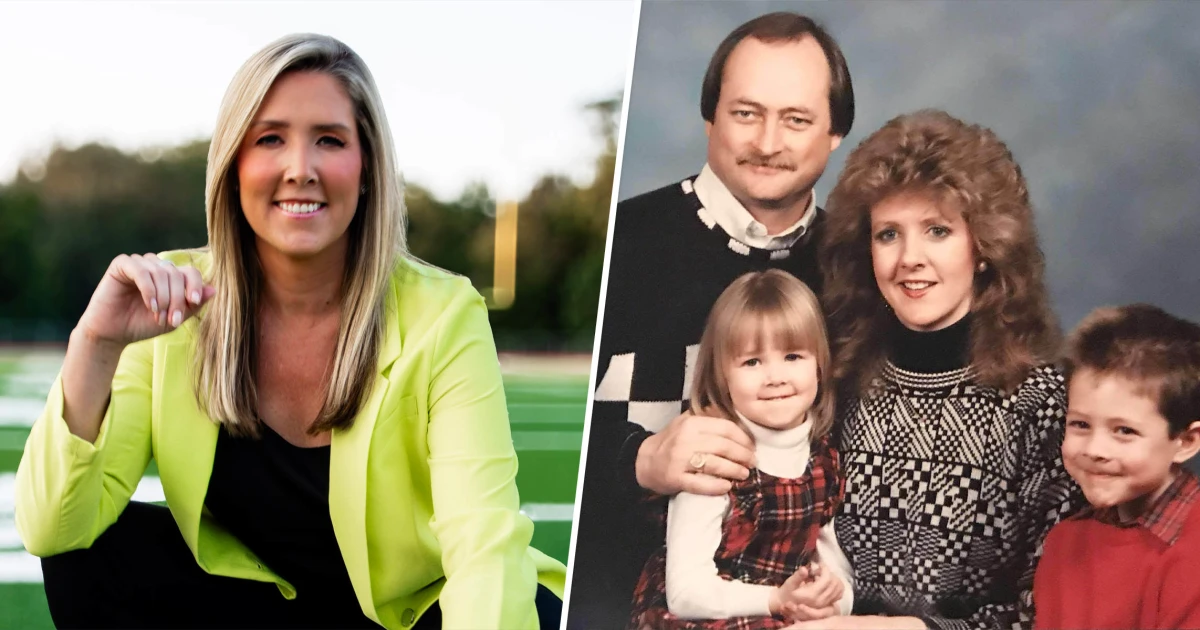
As Lauren Sisler made her way through the crowded airport terminal in March 2003, she frantically scanned the crowd for her father, desperate for a hug. Just hours earlier, the then-college freshman had received a devastating late-night phone call: her mother, Lesley had died.
“My dad was like, ‘Lauren, get on the next plane and I’ll pick you up,” Sisler, 40, tells TODAY.com. But when she arrived, it was not Butch who was waiting at baggage claim. It was her uncle with even more unimaginable news: Butch had inexplicably passed away, too.
Sisler, 18 at the time time, remembers feeling frozen, the words barely sinking in as her mind struggled to process what she was hearing.
“I’d talked to both of them the night they died and they sounded totally normal and happy,” she says. “It just didn’t make sense.”
Her older brother, Allen, was equally bewildered. He, too, hadn’t noticed anything amiss. Butch and Lesley had been in good spirits and appeared to be perfectly healthy.
The questions and confusion lingered for months, until ninety days later, when the toxicology reports arrived, bringing answers that Sisler had been desperately waiting for. The revelations would upend her world.
Lesley and Butch had each ingested an entire pack of fentanyl, a powerful synthetic opioid. Their deaths, at ages 45 and 52, respectively, were ruled accidental overdoses.
“I was in total shock,” she says.
Her parents had been silently struggling with an addiction to pain medication, a struggle they had hidden even from their own family.
When Sisler recounts her childhood in Roanoke, Virginia, she describes it as “white picket fence.” She was extremely close to her brother, Allen, and her family deeply supportive of her gymnastics career, which would ultimately earn her a scholarship to Rutgers University.
“All their attention was on us, the kids,” Sisler says. “They did everything they could to give us the best chance to succeed in life.”
Somehow that never changed, even as Lesley and Butch spent four years secretly abusing prescription drugs.
It began in 1999, when Lesley was referred to a pain management clinic after undergoing surgery for degenerative disc disease. She was prescribed OxyContin, and when the medication appeared to help, Butch scheduled an appointment of his own. He had been seeing a doctor for back pain and was soon given the same medication.
There were small signs along that way that something wasn’t right, though Sisler notes that hindsight makes everything clearer.
During her freshman year, when Sisler came home for Thanksgiving, she was jolted awake one night by her mother’s terrified scream, “Dad’s not breathing!” She called 911 and paramedics rushed in, managing to resuscitate him. Everything appeared fine, and Sisler returned to Rutgers believing her father had merely had a bad reaction to medication. In reality, he had overdosed.
Three months later, both of her parents were gone.
Sisler would spend a decade asking herself how this could have happened. She reveals the answer in her book “Shatter Proof.”
“Five letters,” she says. “S-H-A-M-E.”
Not only does Sisler believe her parents were too ashamed to ask for help, she also felt shame about how they died. She even crafted a “sugarcoated story” to tell others. Butch had a heart attack, and Lesley had respiratory failure, technically not a lie, but far from the full truth.
“They both went into the freezer and sucked a whole fentanyl patch and overdosed on it,” Sisler says.
After Sisler graduated and began moving up the ranks in broadcast journalism, working for CBS Sports and later ESPN, she lived in fear that someone would uncover her past.
“I was terrified employers would think, ‘Oh, she has parents who were junkies. She’s a risk, she comes from a bad background,’” Sisler says. “I was putting a label on myself before anyone else could.
Then, in 2016, as opioid overdoses continued to make national headlines, Sisler resolved to speak publicly about her own experiences. As a journalist, how could people trust her if she could not be honest and transparent about her own story?
“I was bound to these shackles of shame, imprisoned by them, and it wasn’t until I started speaking out that I began healing,” she says. “Shame loses its power when we bring it into the light.
She emphasizes the importance of reframing struggle, viewing moments of shame and loss not as the final word on one’s life, but as opportunities for growth, a lesson she wishes her parents had recognized. It’s a lesson she now hopes to pass on to her 2-year-old son, Mason, whom she shares with her husband John Willard.
“Your hardest chapter can be a wonderful, defining moment,” she says. “It’s not the thing that breaks you, it’s the thing that builds you.”
After Lauren started sharing her parents’ story, their friends began reaching out. They were surprised, but not judgmental “They were like, ‘We love your parents, and it gives us peace to know how they died,’ Sisler says. “The truth really will set you free.”



